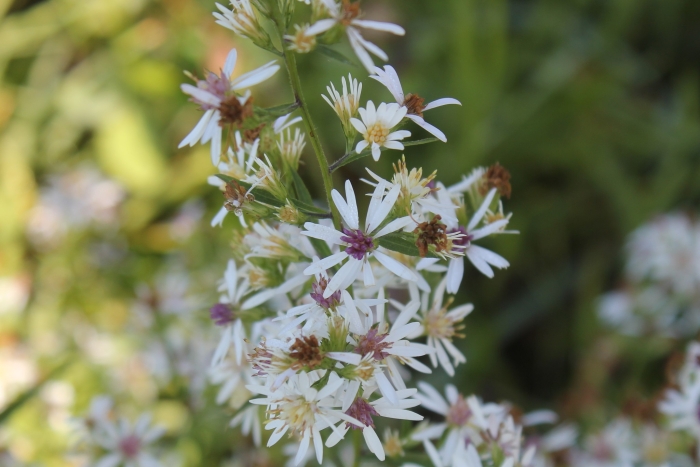Arrowleaf Aster
(Symphyotrichum urophyllum)
Arrowleaf Aster (Symphyotrichum urophyllum)
/
/

Quinten Wiegersma
CC BY 4.0
Image By:
Quinten Wiegersma
Recorded By:
Copyright:
CC BY 4.0
Copyright Notice:
Photo by: Quinten Wiegersma | License Type: CC BY 4.0 | License URL: http://creativecommons.org/licenses/by/4.0/ | Rights Holder: Quinten Wiegersma | Publisher: iNaturalist | Date Created: 2018-09-23T09:48:35-07:00 |



















































Estimated Native Range
Summary
Symphyotrichum urophyllum, commonly known as Arrowleaf Aster, is a semi-deciduous perennial herb that is native to a variety of habitats including open woodlands, bluffs, forest edges, and roadsides in the Eastern United States and parts of Canada. It typically grows to a height of 40 to 120 centimeters (1+1⁄4 to 4 feet) and is recognized by its dense, pyramidal clusters of composite flowers. The flowers feature white ray florets and disc florets that are white to cream, turning pink as they mature, and are most showy from late summer to fall.
Arrowleaf Aster is valued for its late-season blooms that provide a vital nectar source for pollinators. It is often used in naturalized plantings, wildflower gardens, and as a border plant in part shade gardens. This species is adaptable to a range of soil conditions but prefers medium moisture and well-drained soils. While it thrives in part shade, it can also tolerate full sun if moisture is consistent. Arrowleaf Aster can spread by rhizomes and self-seeding, which should be considered to prevent unwanted spread in smaller gardens. It is relatively low maintenance and can be an excellent choice for adding late-season color to a garden.CC BY-SA 4.0
Arrowleaf Aster is valued for its late-season blooms that provide a vital nectar source for pollinators. It is often used in naturalized plantings, wildflower gardens, and as a border plant in part shade gardens. This species is adaptable to a range of soil conditions but prefers medium moisture and well-drained soils. While it thrives in part shade, it can also tolerate full sun if moisture is consistent. Arrowleaf Aster can spread by rhizomes and self-seeding, which should be considered to prevent unwanted spread in smaller gardens. It is relatively low maintenance and can be an excellent choice for adding late-season color to a garden.CC BY-SA 4.0
Plant Description
- Plant Type: Herb
- Height: 1-4 feet
- Width: 0.2-0.8 feet
- Growth Rate: Moderate
- Flower Color: White, Blue
- Flowering Season: Summer, Fall
- Leaf Retention: Semi-Deciduous
Growth Requirements
- Sun: Part Shade
- Water: Medium
- Drainage: Medium
Common Uses
Bee Garden, Bird Garden, Butterfly Garden, Low Maintenance
Natural Habitat
Open woodlands, bluffs, forest edges, and roadsides
Other Names
Common Names: White Arrowleaf Aster, White Arrow Aster, White Arrow-Leaved Aster, Aster Urophylle, Arrowleaf Aster
Scientific Names: , Symphyotrichum urophyllum, Aster urophyllus, Aster sagittifolius var. dissitiflorus, Aster sagittifolius var. glomerellus, Aster hirtellus, Aster sagittifolius f. hirtellus, Aster sagittifolius var. urophyllus, Aster urophyllus var. glomerellus,
GBIF Accepted Name: Symphyotrichum urophyllum (DC.) G.L.Nesom